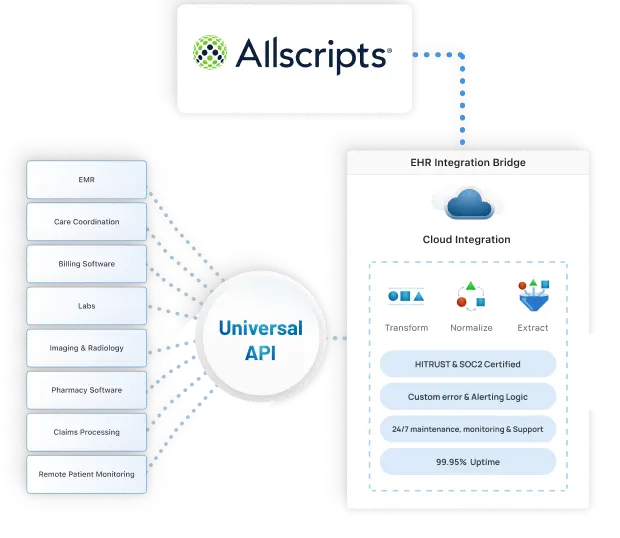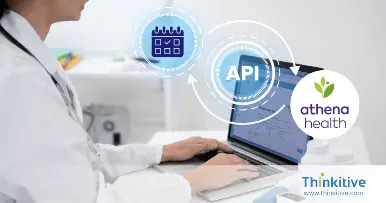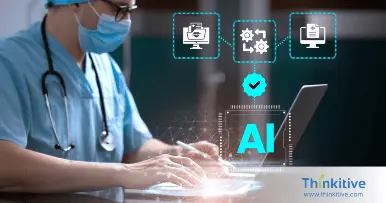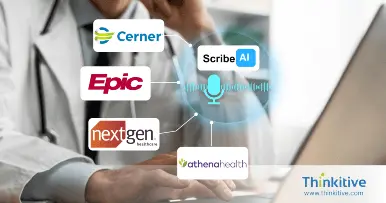Allscripts EHR INTEGRATION
Why Do You Need Allscripts EHR Integration for Your Practice?
Allow your teams to work smarter with Allscripts EHR integration. Reduce data silos by enhancing Allscripts custom EHR interoperability and automate routine processes for better efficiency.
Unified Systems
Unify disconnected systems across the globe for connected care delivery
21 Countries
Process Efficiency
Eliminate manual data entry to improve efficiency
40% More Efficient Process
Proven ROI
Practices reported revenue boosts through automation and integration
30% Revenue Increase
CUSTOM ALLSCRIPTS EHR INTEGRATION SERVICES
Our End-to-End Integration Services
Make your healthcare software solution interoperable and allow them to interact with each other easily and effectively with our complete custom Allscripts EHR integration services.
Access to Allscripts Sandbox & Production Environment
- Developer portal registration & approval
- Credential setup for secure access
- Sandbox configuration & testing
- API documentation review & analysis
- Integration prep using sample data
Allscripts EHR Integration Services
- Custom Allscripts API integrations
- HL7 & FHIR-based interoperability
- Third-party system & app integration
- Mirth Connect setup & configuration
- Custom workflow & interface development
Allscripts Integration Consultation
- Integration planning & strategy design
- Comprehensive testing & validation
- Deployment & go-live assistance
- Post-implementation maintenance support
- Continuous monitoring & issue resolution
Let’s Get Started With Your Allscripts EHR Integration?
Get started by accessing your system and let’s start your digital transformation journey into a connected healthcare ecosystem.
ALLSCRIPTS EHR INTEGRATION BENEFITS
Before & After Allscripts EHR Integration
ALLSCRIPTS EHR INTEGRATION SOLUTIONS
How we Integration Your Healthcare System with Allscripts
1. SMART-ON-FHIR Integration with Allscripts
Our team of integration experts has extensive experience in SMART-on-FHIR integration with Allscripts. We develop SMART-on-FHIR solutions for both patient-facing and provider-facing applications, enabling secure and seamless exchange of medical information.
We carefully design the workflow and user experience for your SMART-on-FHIR app, ensuring smooth interaction with patient data, efficient navigation between screens, and intuitive functionality for all users.
We create the patient app within the Allscripts Developer Portal, install the required development software, and set up a testing environment to simulate Allscripts EHR interactions. Allscripts FHIR API is a RESTful, resource-based API supporting both JSON and XML formats, using unique identifiers to access relevant healthcare resources.
2. Custom Middleware & Interface Development for Allscripts Integration
We develop custom middleware and interfaces to act as a bridge between healthcare platforms and Allscripts EHR. These solutions collect health data from multiple standards, including Allscripts FHIR APIs, HL7 messages, DICOM images, and CCDA documents, and convert it into a unified API that can be seamlessly mapped to client platforms.
Our team identifies integration requirements—including data elements, functionalities, and protocols—and defines a robust middleware architecture tailored to your needs. We carefully evaluate multiple factors to ensure optimal performance and scalability.
We study Veradigm Allscripts API integration documentation and SDKs to understand endpoints, authentication methods, and data models. By analyzing data structures and formats from both Allscripts EHR and client systems, we ensure smooth data conversion, full compatibility, and adherence to industry standards.
3. Mirth Connect Integration for Allscripts
Mirth Connect is an open-source integration engine that serves as middleware between healthcare platforms and Allscripts. It can be installed on a server or machine, enabling seamless data exchange across systems. Our team has extensive experience configuring network settings, database connections, and security parameters for secure integration.
We create and configure channels to define communication and data transformation processes. Each channel includes source and destination connectors, integration endpoints, data formats, and transformation rules. We also define message structures and create data mappings to convert data between formats efficiently.
Our team leverages Mirth Connect’s support for HL7, FHIR, web services, and RESTful APIs to ensure robust Allscripts interoperability. Additionally, we develop custom scripts and transforms within Mirth Connect to handle specialized data transformations, calculations, and business logic, ensuring smooth and accurate integration between Allscripts and client platforms.
4. Resources We Can Integrate with AllScripts
We integrate a wide range of FHIR resources with Allscripts EHR, enabling seamless data exchange and interoperability across your healthcare platform.
1. Allergy Intolerance
2. Binary
3. Care Plan
4. Care Team
5. Condition
6. Device
7. Diagnostic Order
8. Diagnostic Report
9. Document Reference
10. Encounter
11. Goal
12. Immunization
13. Location
14. Medication
15. Medication Order
16. Medication Request
17. Medication Statement
18. Observation
19. Organization
20. Patient
21. Practitioner
22. Practitioner Role
23. Procedure
1. Allergy Intolerance
2. Binary
3. Care Plan
4. Care Team
5. Condition
6. Device
7. Diagnostic Order
8. Diagnostic Report
9. Document Reference
10. Encounter
11. Goal
12. Immunization
13. Location
14. Medication
15. Medication Order
16. Medication Request
17. Medication Statement
18. Observation
19. Organization
20. Patient
21. Practitioner
22. Practitioner Role
23. Procedure
This comprehensive coverage ensures that your applications can securely access, update, and manage critical healthcare data across all relevant domains.

See How Can Custom Allscripts EHR
Integration Pay for Itself?
ALLSCRIPTS EHR INTEGRATION PROCESS
Custom Allscripts EHR Integration Process
Process
Requirement Analysis
Identify client’s needs for interaction and the expected outcomes of the integration.
Evaluate Integration Capabilities
Evaluate various integration offered by Allscripts such as APIs, HL7 interfaces, FHIR and DICOM.
Design & Develop Integration Interface
Implement integrations using APIs, SDKs, and configurations to connect systems, exchange data, and ensure accurate transformations.
Build & Test
Create a development environment to replicate the necessary infrastructure, data, and security configurations. Then test it for accuracy, reliability and performance.
Go Live
Update your app with the Production keyset, deploy it to the Production environment, and coordinate with Allscripts or clients if applicable.
Let’s Integrate Your Allscript EHR Integration
Get your first free consultation and uncover how custom Allscripts EHR integration can change your practice.
Case studies
Sneak-Peek into Our Successful Custom Allscripts EHR Integration Projects
Explore how our tailored Allscripts EHR integrations have streamlined workflows, improved data exchange, and enhanced clinical efficiency for healthcare organizations.
CUSTOM ALLSCRIPTS INTEGRATION PLANS
Hire Allscripts EHR Integration Experts
Choose an engagement model that suits your specific Allscripts EHR integration needs and ideally fits your budget. We have a flexible model that accommodates according to your needs.
Time & Material Model
Ideal for evolving requirements. Pay only for completed work as project scope and milestones adjust dynamically throughout development.
Hire Dedicated Team
Best for extending your in-house team with skilled remote professionals. Choose resources, interview or trial them, and pay hourly based on utilization.
Fixed Price Model
Suitable for projects with a clearly defined, unchanging scope. Fixed cost and timeline. Best recommended for smaller, well-documented projects.

Why Thinkitive is The Best Allscripts EHR Integration Company for You?
![]() Tailored to your Needs
Tailored to your Needs
Thinkitive’s first step to developing ... customizable EHR software is to understand your unique needs and requirements. Based on that, our development team develops a customized software solution to meet your requirements and solve your problems.
![]() Ready-to-use Components
Ready-to-use Components
With our ready-to-use technology ...components like video conferencing, appointment, scheduling, and SOAP notes, fasten your custom EMR software development process.
![]() Third-Party Integration
Third-Party Integration
Integrate your EHR software system with ... multiple third-party systems like Telemedicine, RPM Devices, Labs, Radiology, etc., to build a complete virtual healthcare ecosystem.
![]() Affordable EHR Solutions
Affordable EHR Solutions
With our ready-to-use base EHR ...software framework, we give you an affordable custom EHR software solution specifically designed for your healthcare practice.
![]() In-Depth Domain Expertise
In-Depth Domain Expertise
With our ready-to-use base ...EHR software framework, we give you an affordable custom EMR software solution specifically designed for your healthcare practice.
![]() Timely Delivery
Timely Delivery
We have curated an EHR system ...development process that covers all the aspects of your healthcare practice’s unique needs and requirements with transparency for on-time delivery.



